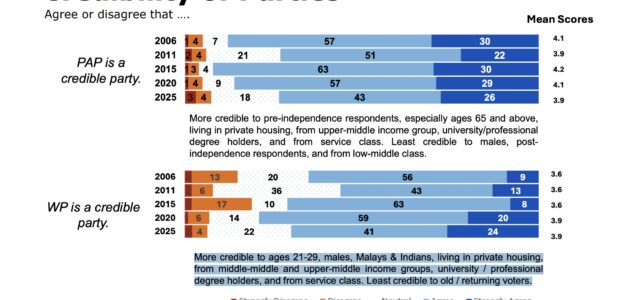IPS GE2025 survey: Younger voters chose status quo, but WP more credible to S’poreans age 21-29
ips-ge2025-survey-younger-voters-chose-status-quo-but-wp-more-credible-to-sporeans-age-21-29
#IPS #GE2025 #survey #Younger #voters #chose #status #quo #credible #Sporeans #age,
SINGAPORE: The Institute of Policy Studies (IPS) published the results of its post-election survey earlier this week, wherein 2,056 individuals of voting age were polled online.
The May 3 polls are widely seen as a show of support for the ruling People’s Action Party, which gained more than 4 percentage points since GE2020. Its vote share rose from 61.24 per cent to 65.57 per cent in this year’s elections.
The results highlight a number of key findings, including higher numbers for the PAP among voters ages 21 to 39. Among voters aged 40 and older, meanwhile, there has been an increase in support for political pluralism.
However, the study also showed that the opposition Workers’ Party is more credible to respondents aged 21 to 29.
Survey participants identified cost of living as the most important concern, with 74 per cent characterising it as “very important,” a substantial increase of 27 per cent since GE2020. Meanwhile, 69 per cent also characterised the need for a good and efficient government as “very important” and 61 per cent said the same for the affordability of homes for Singaporeans.
When it came to candidates, the survey’s respondents placed a premium on honesty and efficiency, as well as credentials and experience in grassroots and community.
How the different parties fared
Whilst emerging as the winner, the PAP saw a slight dip in credibility, and the WP, Singapore’s largest opposition party, saw a slight increase. By mean scores, the PAP and the WP have inched closer to each other.
The PAP is “more credible to pre-independence respondents, especially ages 65 and above, living in private housing, from upper-middle income group, university/professional degree holders, and from service class. Least credible to males, post-independence respondents, and from low-middle class,” the study says.
The WP is more credible to “ages 21-29, males, Malays and Indians, living in private housing, from middle-middle and upper-middle income groups, university/professional degree holders, and from service class. Least credible to old/returning voters.”

The Progress Singapore Party (PSP), meanwhile, the only other opposition party to have been represented in the last Parliament, decreased in credibility to the point that it has a lower credibility rating than the Singapore Democratic Party (SDP), whose rating rose.

The Independent Singapore reached out to the WP and the SDP to comment on the matter.
The SDP had this to say: “One of the most striking findings presented was that less than half of the respondents agreed or strongly agreed with the statement, ‘there is no need to change the election system because it has served Singaporeans well’.
This clearly shows that Singaporeans are open to the idea of a more free and fair electoral system. The sentiment is one that we have taken into account and are building upon with our electoral reform initiative, Project Reform.
Project Reform launched on August 23 2025, with a highly successful forum titled ‘Where Do We Draw the Line?: Reimagining Singapore’s Electoral Future,’ which was attended by 340 members of the public, academics, civil society activists, and political figures.
The WP has not responded to TISG’s request for comment. On Wednesday (Sept 3), however, WP Secretary-General Pritam Singh posted his thoughts in a social media post, wherein he had questions of his own regarding the results’ race-based findings. Mr Singh’s post may be found here. /TISG
